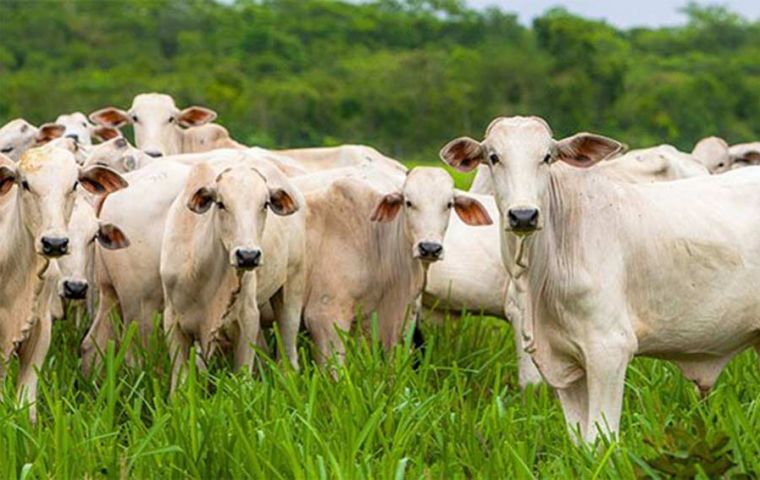MercoPress. South Atlantic News Agency
Challenge for Brazil beef market: plenty of cattle, domestic demand flat and China bargaining prices
 Beef prices in Brazil have been dropping on the back of a higher number of cattle coming to market
Beef prices in Brazil have been dropping on the back of a higher number of cattle coming to market Brazilian cattle prices are down this year and strong demand for the country’s beef exports will widen Brazilian meatpackers’ margins in the short term, according to analysts, though weakness in the domestic market could undercut those gains.
About 30% of Brazil’s beef production is sent abroad, with the rest consumed at home. But high inflation in the country has cut into consumers’ purchasing power, weakening domestic demand for beef and pushing companies to look for export markets.
Live cattle prices on the Sao Paulo market are on a downward trend, with the “arroba” – a standard 15-kilo measure used as a benchmark – trading late last week at an average of 278.79 reais (US$ 52.87), a significant discount to the first quarter’s 332.23 reais, according to Scot Consultoria, an agribusiness consultancy.
“The margins of slaughterhouses that export has improved,” said Alcides Torres, director of Scot Consultoria. He added that converting these bigger margins into profits would vary from company to company.
Beef prices in Brazil have been dropping on the back of a higher number of cattle coming to market, as well as the more aggressive negotiating stances adopted by foreign buyers, especially China.
A weaker Yuan currency has pushed China, which accounted for almost 52.8% of Brazilian beef purchases in September, to press for discounts from sellers in the South American nation, Safras & Mercado analyst Fernando Iglesias said. In September, Brazil exported 231,400 tonnes of beef protein abroad, a record-breaking result.
According to government data, Brazil’s beef exports in October have already surpassed those from the same month in 2021.
Companies like Minerva, JBS, and Marfirig should be able to translate such strong performance into positive figures in their balance sheets, despite the latter two facing a more adverse scenario in the United States.
“The record of beef exports in August and September should favor the third-quarter results of the listed slaughterhouses,” said Mary Silva, an analyst at BB Investimentos, adding that Minerva was likely the biggest beneficiary because of its export-heavy business.
According to BB Investimentos, Marfrig and JBS, although favored in Brazil, also tend to report a drop in volumes and a greater pressure on margins in their beef units in the US due to the increase in the cost of cattle and potential cooling of demand for beef amid inflationary pressure among Americans.
In addition to the improvement in the cattle cycle, with some expansion in the supply of animals available for slaughter, weak domestic consumption contributes to flattening the value of cattle in Brazil.
According to the University of São Paulo research center for applied economics (Cepea), meat sales in the domestic market have not yet picked up, as was expected for this last quarter, based on the typical increase in acquisitions to build up inventories for the end-of-year holidays.
“Thus, although beef exports remain intense, weak domestic sales limit possible increases in the value of live cattle,” as found in a Cepea statement.
Another factor putting pressure on the most recent drops in the arroba price originates in beef export negotiations with its biggest buyer, China.
“The Chinese seek to renegotiate the price paid per imported ton of meat, which causes meatpackers to drop the price of the benchmark arroba here,” cautioned Rodrigo Brolo, partner at Criteria Investimentos.
According to Fernando Iglesias from Safras & Mercado, the devaluation of the Yuan in the international market caused a change in the behavior of Chinese importers, who began to renegotiate export contracts seeking more advantageous prices.
“A devalued Yuan means more expensive imports, and China becoming a less competitive importer. So the country seeks to renegotiate contracts and has, in fact, managed to reduce meat prices on the international market,” he said.
Government data show that the value of a ton of fresh beef exported by Brazil until the second week of October was US$5,931, up from US$5,166 a year earlier, but below the US$6,132 recorded in August this year, for example.




Top Comments
Disclaimer & comment rulesCommenting for this story is now closed.
If you have a Facebook account, become a fan and comment on our Facebook Page!